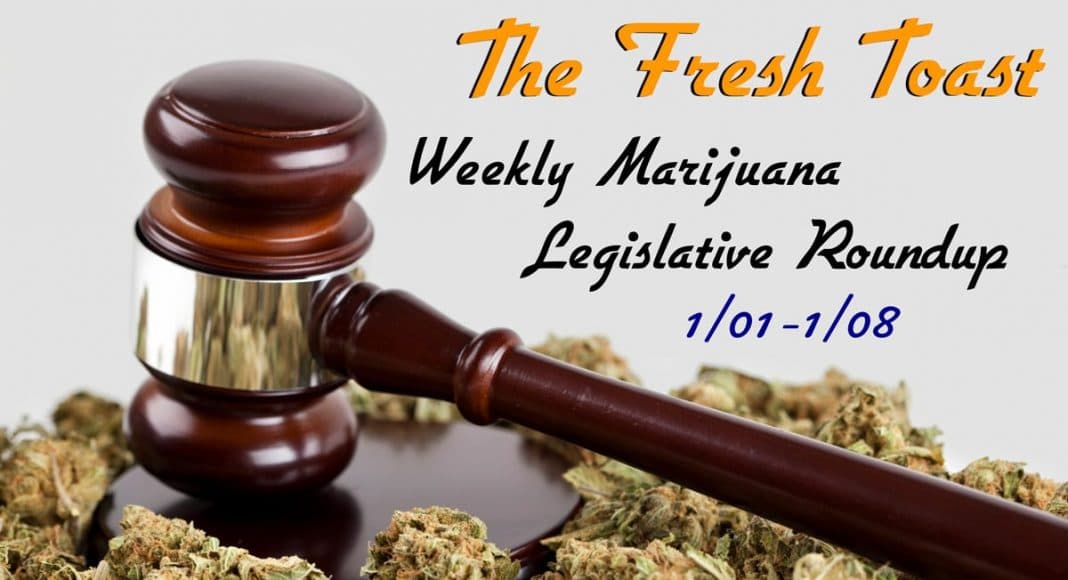The big news last week, of course, was Attorney General Jeff Sessions rolling back protections for states that have legalized cannabis consumption. Despite the federal setback, states are continuing to move ahead with sensible marijuana laws. In Vermont, a bill to regulate recreational cannabis passed the House. And in Oklahoma, yes Oklahoma!, the governor announced that a medical marijuana referendum will be on the ballot in June. Read all about these developments and more in The Fresh Toast’s Marijuana Legislative Roundup for Jan. 9.
National:
On Thursday, Attorney General Jeff Sessions issued a memo to all US Attorneys effectively rescinding the Justice Department’s hands-off policy toward state efforts to implement recreational cannabis legalization. In a 2013 memorandum, the Justice Department issued a set of guidelines for states seeking to implement marijuana legalization without fear of a federal crackdown. The federal enforcement priorities in the memo included: preventing distribution of marijuana to minors; preventing drugged driving and the exacerbation of other adverse public health consequences; preventing legal marijuana proceeds from going to criminal organizations; preventing state-legal cannabis sales from being used as a cover for illegal activity; preventing violence and the use of firearms associated with marijuana growth or distribution; preventing marijuana from being transported out of states where it is legal; preventing cannabis growth on public lands; and preventing marijuana possession or consumption on federal property.
In the memo issued last week, Sessions offers no specific instructions regarding federal marijuana enforcement, but instead allows US Attorneys to determine what federal resources should be devoted to marijuana enforcement based on their own assessment of priorities in their district. Sessions, who has long been an outspoken critic of marijuana legalization, wrote a series of letters to the governors of Washington, Oregon, and Alaska expressing grave concerns over each state’s ability to comply with the Cole Memo guidelines. This led to fears in states where cannabis is legal that a federal crackdown may be imminent.
-
Related Story: Twitter Is Freaking Out About Jeff Sessions And Marijuana
Since the release of Sessions’ memo, several US Attorneys have announced that they would not be changing their enforcement policies in response. Officials in Massachusetts, where recreational sales are set to begin on July 1, also announced last week that they will move forward with implementation. It remains unclear what impact the new federal policy will have on state legalization efforts. However, the uncertainty it creates will provide further ammunition to critics of recreational cannabis and make it difficult for state-legal marijuana businesses to operate.
Vermont:
On Thursday, the Vermont House passed a bill to legalize recreational marijuana in the state. The bill would allow adults 21 and older to possess up to one ounce of cannabis and grow up to six plants at home, with a limit of two mature plants and four immature seedlings per household. In June, an earlier version of the bill was passed by both houses of the Vermont Legislature and then vetoed by Governor Phil Scott, who outlined several public health and safety concerns that needed to be addressed before he would sign it. During a special legislative veto session, the Senate passed a revised version of the bill that addressed the governor’s concerns but the session ended before the House was able to do the same.
After the veto session ended, Scott announced his commitment to signing recreational cannabis legalization into law, and convened a panel to study state legalization efforts and make recommendations as to how Vermont should proceed. Some of these recommendations were incorporated into the version of the bill passed by the House on Thursday, which will likely be taken up by the Senate this week. If the legislation is enacted, as seems likely, Vermont will become the first state to legalize recreational marijuana by an act of the legislature, rather than a statewide ballot referendum.
Oklahoma:
On Thursday, Oklahoma Governor Mary Fallin announced that voters will decide on medical marijuana legalization in a ballot referendum on June 26. In 2016, supporters gathered enough signatures to place the proposal on the ballot but the date had not yet been announced. If approved, doctors would be able to recommend patients for a state-issued medical cannabis license. Licensed patients would be allowed to possess up to three ounces of marijuana, and grow up to six mature plants and six seedlings legally.


